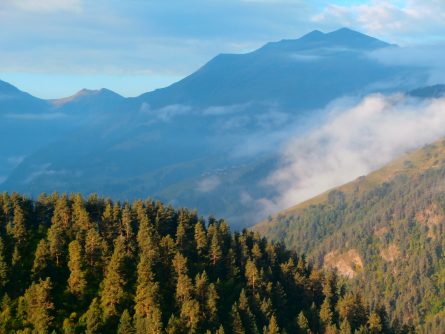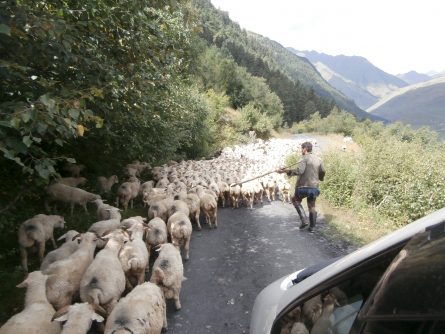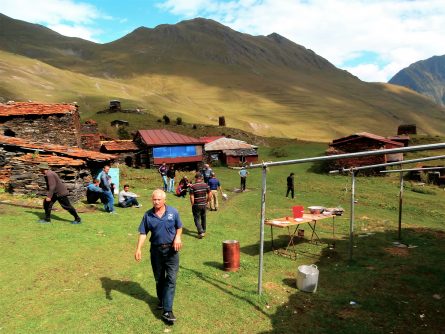Tusheti, Georgia – The Great Caucasus Mountains (Part 1)
Tusheti, in the Caucasus Mountains is a most remote part of Georgia

The thing is this; the world is full of remote places, but usually one doesn’t want to be in them, and then there are those faux-remote places that are simply odd hybrids. Then there is Tusheti, remote, hospitable, comfortable and (one hopes) unassailable.
Simply driving up the road from the gentle, agricultural Alazani Valley is daunting, and it is easy to realise how such isolated people have remained so; what is harder to comprehend is how the outside world has allowed the world of the high mountains remain so independent.
For these are not dumb and insular people; oh no! Each year the population of the mountain villages bring their animals and families down to the lowlands in October before meters of snow render the road impassable for the next seven months.
In May the migration is reversed, and the families take their world back over the Abano Pass and again repopulate the villages of the valley. Some thirty or so families remain in the highlands throughout the year, and in some of the smallest communities, without phone connection or power, the winter will pass slowly, but in constant and absolute communion with their world, the history of the Tush people that both drives and ensures its future.

The region is extraordinary. Surrounded by a circle of high, high mountains, with only one “road” and a few horse tracks scaling the rugged passes accessing the outside world there is a small lowland bowl where the major settlement of Omalo lies. Two rivers pour down between sharp mountain sides, and it is along these river banks that another dozen or so small communities lie.
We drove first to Darklo, a community of about 200 souls, and an important centre on the Pirikitis Alazani River. It is a lovely village; a clutch of fifty or so wooden houses overlooking the river, and its collection of towers standing sentry against invasion from the northwest. We spent a couple of hours wandering between the old houses, drinking wild-thyme tea generously provided to us, and enjoyed the curious feeling of timelessness that permeated the village.
And then we continued. The track narrowed as we continued some twenty kilometres upriver to Chesho and eventually to a truly beautiful village called Parsma.
We parked by the river and wandered up to the community; it was a robust walk for a prairie-dweller, and panting embarrassingly at the top, we turned a corner around a large rock and, stepping through a Looking Glass, to the surprise of the community we wandered in.
It was a very holy day, and the village was preparing for their feast, in Georgia the Supra is a vital part of community life, and represents the interdependence of family, friend and life. It is also an excuse to drink one’s body weight in local wine, and party long into the night.

Toasting, feasting, laughing, drinking, eating and loving are the strands from which the fabric of Georgia is woven, and the final piece, hosting strangers, was clearly on their minds as we approached.
Immediately four more plates were ordered; the village leader with a sharp knife in one hand, a horn of wine in the other and disconcertingly a United States Postal Service t-shirt, came to us smiling.
“You must join us”, he said, as translated by our friend Ia, “There is no choice in the matter”. With such an uncompromising start we laughed, and explained that as happy as we were to be invited, we really couldn’t stay. This answer seemed to lack relevance to our position as stranger in a village that had just slaughtered a sheep, cooked it, set aside a bathtub of wine and wanted external company.
“We are off,” we said, “thank you for your kind offer”; we turned and took a step or two. “Wine or Vodka” was the response, emphasised by a very rustic chap with a poor selection of teeth,but an engaging smile and his wife who sported a rather touching mustache. “Wine”, I said.
We edged back to the table that he had been rustically butchering the late sheep, and with a majestic wipe it was cleaned of the worst detritus. An order was called that in retrospect must have been “If the strangers won’t come to our table to feast, bring the feast to this table”.
Cheese, mutton, cucumbers, tomatoes appeared along with the drinking horns that needed to be consumed to ensure both everlasting friendship and a hangover. I drunk horns, chewed mutton (delicious), swallowed some tomato and then, very carefully, taking care to appreciate the marvellous architecture and resilience of the middle-aged forts, we sloped away from this expression of Combat Hospitality and went back to the van.
We continued a further three or four kilometers to Girevi, or almost there as the road finally ran out, and beyond this point, only Tush horsemen, skilled to levels unseen in contemporary life, and outside a circus environment, could proceed.
We had reached a point on the earth that few ever imagine and fewer still ever visit. Three or four miles from the Chechen border we were in a truly special place. For once, I was speechless and still am having difficulty in comprehending where I was and how I felt. Tushetian life is intact, clearly satisfying and as lively and resonant today as it was a thousand years before.
End of Part One
